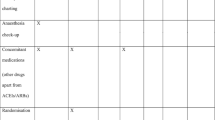Abstract
The use of angiotensin-converting enzyme inhibitors (ACE-I) and angiotensin II receptor blockers (ARB) for the treatment of hypertensive obese patients is steadily increasing. Some studies have reported that the use of these drugs was associated with an increased risk of hypotensive episodes, during general anaesthesia. The number of bariatric procedures is also increasing worldwide, but there is a lack of studies investigating the hypotensive effect of renin–angiotensin system (RAS) blockers in severely obese patients during general anaesthesia for bariatric surgery. The aim of this pilot study was to evaluate hemodynamic changes induced by general anaesthesia in obese patients chronically treated with ACE-I or ARB compared to a control group not treated with antihypertensive therapy. Fourteen obese subjects (mean body mass index (BMI) 47.5 kg/m2) treated with ACE-I or ARB and twelve obese (mean BMI 45.7 kg/m2) controls not treated with antihypertensive therapy underwent general anaesthesia to perform laparoscopic bariatric surgery. Systolic blood pressure, diastolic blood pressure, and heart rate were monitored continuously and registered at different time points: T0 before induction, then at 2, 5, 7, 10, 15, 20, 30, 60, 90, 120, and 150 min after induction, and the last time point taken following recovery from anaesthesia. A progressive reduction of both systolic and diastolic blood pressure values was observed without significant differences between the two groups. A similar trend of heart rate values was observed. In conclusion, our pilot study suggests that RAS blockers may be continued during the perioperative period in patients undergoing bariatric surgery, without increasing the risk of hypotensive episodes.



Similar content being viewed by others
References
Ramírez-Sánchez M, Prieto I, Wangensteen R, et al. The renin-angiotensin system: new insight into old therapies. Curr Med Chem. 2013;20:1313–22.
Kataja JH, Kaukinen S, Viinamäki OV, et al. Hemodynamic and hormonal changes in patients pretreated with captopril for surgery of the abdominal aorta. J Cardiothorac Vasc Anesth. 1989;3:425–32.
Augoustides JG. Angiotensin blockade and general anesthesia: so little known, so far to go. J Cardiothorac Vasc Anesth. 2008;22(2):177–9.
Brabant SM, Bertrand M, Eyraud D, et al. The hemodynamic effects of anesthetic induction in vascular surgical patients chronically treated with angiotensin II receptor antagonists. Anesth Analg. 1999;89:1388–92.
Colson P, Ryckwaert F, Coriat P. Renin angiotensin system antagonists and anesthesia. Anesth Analg. 1999;89:1143–55.
Cozanitis DA. The importance of interrupting angiotensin converting enzyme inhibitor treatment before spinal anaesthesia—a controlled case report. Anaesthesiol Reanim. 2004;29(1):16–8.
Meersschaert K, Brun L, Gourdin M, et al. Terlipressin-ephedrine versus ephedrine to treat hypotension at the induction of anesthesia in patients chronically treated with angiotensin converting-enzyme inhibitors: a prospective randomized, double-blinded, crossover study. Anesth Analg. 2002;94:835–40.
Boccara G, Ouattara A, Godet G, et al. Terlipressin versus norepinephrine to correct arterial hypotension after general anesthesia in patients chronically treated with renin-angiotensin system inhibitors. Anesth Analg. 2003;98:1338–44.
Bertrand M, Godet G, Meersschaert K, et al. Should the angiotensin II antagonists be discontinued before surgery? Anesth Analg. 2001;92:26–30.
Comfere T, Sprung J, Kumar MM, et al. Angiotensin system inhibitors in a general surgical population. Anesth Analg. 2005;100:636–44.
Kheterpal S, Khodaparast O, Shanks A, et al. Chronic angiotensin-converting enzyme inhibitor or angiotensin receptor blocker therapy combined with diuretic therapy is associated with increased episodes of hypotension in noncardiac surgery. J Cardiothorac Vasc Anesth. 2008;22(2):180–6.
Jordan J, Yumuk V, Schlaich M, et al. Joint statement of the European Association for the study of obesity and the European Society of Hypertension: obesity and difficult to treat arterial hypertension. J Hypertens. 2012;30(6):1047–55.
Wittgrove AC, Clark GW. Laparoscopic gastric bypass, Roux-en-Y-500 patients: technique and results, with 3–60 month follow-up. Obes Surg. 2000;10(3):233–9.
Chowbey PK, Dhawan K, Khullar R, et al. Laparoscopic sleeve gastrectomy: an Indian experience-surgical technique and early results. Obes Surg. 2010;20(10):1340–7.
Romagnoli S, Ricci Z, Quattrone D, et al. Accuracy of invasive arterial pressure monitoring in cardiovascular patients: an observational study. Crit Care. 2014;18(6):644.
Araghi A, Bander JJ, Guzman JA. Arterial blood pressure monitoring in overweight critically ill patients: invasive or noninvasive? Crit Care. 2006;10(2):R64.
Behnia R, Molteni A, Igic R. Angiotensin-converting enzyme inhibitors: mechanisms of action and implications in anesthesia practice. Curr Pharm Des. 2003;9:763–76.
Chang KS, Davis RF. Propofol produces endothelium-independent vasodilation and may act as a Ca2+ channel blocker. Anesth Analg. 1993;76:24–32.
Maguire AM, Kumar N, Parker JL, et al. Comparison of effects of remifentanil and alfentanil on cardiovascular response to tracheal intubation in hypertensive patients. Br J Anaesth. 2001;86:90–3.
Twersky RS, Goel V, Narayan P, et al. The risk of hypertension after preoperative discontinuation of angiotensin-converting enzyme inhibitors or angiotensin receptor antagonists in ambulatory and same-day admission patients. Anesth Analg. 2014;118(5):938–44.
Auron M, Harte B, Kumar A, et al. Renine angiotensin system antagonists in the perioperative setting: clinical consequences and recommendations for practice. Postgrad Med J. 2011;87(1029):472–81.
Rosei EA, Salvetti M, Farsang C. European society of hypertension scientific newsletter: treatment of hypertensive urgencies and emergencies. J Hypertens. 2006;24(12):2482–5.
Acknowledgments
The authors declare the absence of any conflict of interest related to this manuscript.
All procedures performed in this study were in accordance with the ethical standards of the institutional and/or national research committee and with the 1964 Helsinki declaration and its later amendments or comparable ethical standards.
Conflict of Interest
The authors declare that they have no competing interests.
Funding
We have no support or funding to report.
Author information
Authors and Affiliations
Corresponding author
Rights and permissions
About this article
Cite this article
Salvetti, G., Di Salvo, C., Ceccarini, G. et al. Chronic Renin–Angiotensin System (RAS) Blockade May Not Induce Hypotension During Anaesthesia for Bariatric Surgery. OBES SURG 26, 1303–1307 (2016). https://doi.org/10.1007/s11695-015-1862-9
Published:
Issue Date:
DOI: https://doi.org/10.1007/s11695-015-1862-9




